How to Find a Web Developer in 2024
Choosing the ideal web developer for your project can be a challenging task. Use this guide to hire the most suitable candidate for your web development team and ensure success.
 February 5, 2023
February 5, 2023 18 minute reading
18 minute reading
Creating a functional site that’s a seamless extension of your brand and that people will use can be complex.
But more challenging is finding a web development professional you can trust from the scores of options available.
Good news: it’s never been easier to find a reliable web developer who gets your idea, can build a masterpiece for your business, and delivers on time.
This guide will walk you through how to find a web developer for your business needs along with some tips for a smooth hiring process.
What is web development?
Web development is the process of developing websites and web applications on the internet through tasks like:
Coding
Scripting
Technical design
Network configuration
Content management system (CMS) development
With two-thirds of the world’s population expected to be online by the end of 2023, it’s no surprise that web development is rapidly evolving.
Web developers are also in high demand. The Bureau of Labor Statistics expects a 23% employment growth in this field between 2021-2031, with an estimated 21,800 jobs openings each year, on average in that period — much faster than most other technology careers.
And with the rapid growth of increasingly interactive apps, websites, and social networks, it’s likely the strong demand for web developers may outweigh supply.
Web designer vs web developer: Are they different?
Web design and development roles get mixed up as they often look the same from the outside, share a lot in common, and work together.
But web designers and web developers have different duties and specializations, and use different tools.
A web designer designs a site’s layout, usability, and aesthetics to make it visually appealing and delightful to use. A web developer focuses on building the site’s core structure (frontend and backend) and functional programming.
In terms of tools:
A web designer works with design software like Adobe suite (Photoshop, Illustrator, InDesign), Figma, InVision, OmniGraffle, CMS platforms, and more.
A web developer works with programming languages (HTML, CSS, Python, Ruby on Rails, or JavaScript), databases, frameworks, version control/GIT, and other software.
Web designers and developers also specialize in different development niches. For example, designers can focus on UX design, UI design, or visual (UX and UI) design, while developers can specialize in frontend, backend, or full stack development.
Yet, there’s still some overlap in skills between web designers and developers.
“The line between web designer and developer is a little blurred these days, but, depending on the developer, you can hire them for design and development of your site or come to them with a design in hand and hire them for only development,” says Amanda Jones-McNay, owner at AJM Design Studio.
To help you refine your search, let’s look at the specific web developer job responsibilities.
What does a web developer do?
A web developer brings your site’s design and functionality to life by:
Gathering and refining site requirements and specifications based on technical needs
Coding programming languages like HTML, JavaScript, XML, and more using best software development practices
Integrating data from various databases and backend services
Managing technical aspects like performance and traffic handling capacity
Creating and maintaining software documentation
Testing web applications
Ensuring the site’s responsiveness on different mobile platforms and browsers
Collaborating with web designers to match visual design intent and recommending changes that make the site work better
Troubleshooting user experience and performance problems as they arise
Determining how to maintain the site’s security
Expanding, scaling, updating, and maintaining the website as necessary
Keeping abreast of emerging tech and industry trends to apply them into dev projects
In your search for a web developer, you may hear phrases like frontend, backend, and full-stack being tossed around.
These titles represent the different types of web development services. But what’s the difference? And can a web developer do all three?
Let’s review each category.
Types of web developers
Web developers will often master multiple web development categories.
However, it’s important to understand the differences between their specific roles as you search for a web developer.
You may only need to fill one of these roles, or all of them, depending on the complexity of your project.
Here’s an overview of the three main categories:
Front-end web developer: Handles what your site visitors see, including the page layout, graphics integration, and using programming languages to enhance the site.
Backend web developer: Handles the computational logic — background functions and processes — of your site. This includes creating the site’s infrastructure, writing code and ensuring it works, managing access points, and more.
Full-stack web developer: Handles both frontend and backend aspects and can build a complete website.
There’s another (smaller) group of web developers referred to as webmasters, whose role is to manage the site, ensuring apps and links work properly, and keeping it updated. However, a professional full-stack developer can still handle the webmaster’s tasks, especially in smaller companies with leaner teams and limited budgets.
This brings us to the next thing: do you really need a web developer? Or can you DIY your website project and get by without the additional expense?
Let’s look at scenarios that would warrant a company to hire a web developer.
How do you know you need a web developer?
When should I hire a web developer? This question doesn’t always have a simple answer. There are particular instances in which you’ll get an unqualified “yes,” but often it’s a matter of evaluating several factors.
Some questions you can ask yourself before engaging a web developer may include:
Do I need to develop a new form?
Do I need to create a mobile application?
Do I need to troubleshoot my server?
Do I need to optimize for SEO?
Do I need e-commerce?
What type of security do I need for my site?
Not all situations call for a web developer, but consider hiring one if you:
Lack the technical expertise to build and develop a professional website.
Don’t have the time to work on your website but you’re willing to wait a few weeks for the final product.
Have limited customization options and want a fully-customized website or app with a distinctive look, style, and functionality.
Have a sizable budget and are willing to pay a premium on your site for a unique approach.
What makes a web developer a good candidate (or not)?
Many web developers appear to be good at what they do on the surface, but they don’t deliver.
So, how do you differentiate web developers from “good web developers”?
While web developers are more technically inclined, it shouldn’t be the only barometer to use when hiring one. They’ll be part of your dedicated web development team, so you’ll need to assess their soft skills to determine if they’ll be a cultural fit.
A good web developer may possess several soft skills, but the major ones to look out for are:
Problem-solving skills: Find a developer who can think outside the box for creative and efficient solutions to complex problems.
Excellent communication: A good web developer will keep you in the loop to ensure you’re satisfied with the progress and performance of the project from start to finish.
“We onboard a new developer within two weeks. After the first two months we can say whether they’re a good fit based on their output,” says Oleg Donets, Founder and Chief Marketing Officer at Real Estate Bees. “If they don’t ask many questions about the product and the process, they most likely won't be a good fit.”
Good planning and organization: They can juggle multiple tasks with business acumen despite time and budgetary constraints.
Passion to learn and keep up with trends: They’re constantly seeking out knowledge and new ways of doing things, newer versions of frameworks, libraries, and languages to implement, and research possible solutions to inevitable challenges.
Teamwork: Web devs rarely work alone because good software is built by teams comprising multiple dynamic roles. Having a team mentality is critical to your site’s success — and they don’t let their ego come in between their work.
Ability to multitask: A good developer should be able to observe and attend to several tasks simultaneously. This helps increase efficiency, especially when they’re working under tight timeframes.
Attention to detail: The intricacy of visual design elements, coding language, and other web development elements call for a meticulous developer who can produce professional work.
What programming languages/tools should your web developer be proficient in?
Soft skills apply across different roles. But, a good web developer must have hard technical skills, which are required for their career.
Every organization has different needs, but here are the main technical developer skills to look out for when determining the best-fit candidates:
Coding: This is one of the hard skills a developer must have. To write code, they must understand web programming languages, such as:
HTML PHP JavaScript Python Ruby CSS ASP.NET Angular.js Node.js TypeScript Elm Scala Go Rust Swift
Responsive design: Developers should create sites that will work and look good on different devices like computers, smartphones, tablets.
Visual design: While web designers handle most of the aesthetics, a developer takes the designer’s blueprint and constructs the frontend and backend to ensure it looks and functions as it should and while boosting your brand’s marketability.
Technical SEO (Search engine optimization): A web dev must have a basic understanding of SEO and how search engines rank a website. That way, they can optimize your site’s design to boost its search rankings.
Version control: A developer should be able to track and control source code changes without having to start over each time they run into a problem.
What CMS should your web developer be familiar with?
Besides programming tools, web developers also work with content management systems (CMS).
Some developers prefer to code websites in HTML, particularly for sites with fewer pages and don’t need regular updating. Others prefer using a CMS for larger, broader, and more dynamic sites with multiple pages that need constant updates.
A CMS makes it easier for web developers to make changes or additions to the site, such as editing existing pages or publishing new ones, creating web forms, adding a store, and more.
Some popular CMSs a web developer should be familiar with include:
On the more advanced side, you’ll find Enterprise Content Management (ECM), which supplements a typical web CMS’s features by facilitating workplace collaboration, integrating e-commerce, and document and digital asset management.
Knowing which CMS you want to use makes it easier to narrow down your search for a web developer. Otherwise, you may end up with a generalist who will require training before they can build on your site.
Key takeaways
A web developer focuses on building a site’s core infrastructure and its functional programming.
There are different categories of web developers: frontend, backend, or full-stack. A full-stack developer can manage both frontend and backend tasks.
When hiring a web developer for your project, look for both soft and technical skills.
The sweet spot is a developer who has experience with major programming languages and can work with almost any popular CMS without little to no supervision.
Where to find a web developer

Finding a good web developer who can efficiently help with your website or app isn’t always easy. Don’t expect to find one by simply reading ads or looking online for a developer nearby. You may not find sufficient information in such sources to help you make a valid judgment.
Fortunately, you have plenty of other options. Here are a few helpful places:
Fiverr: The world’s largest online marketplace and most popular place to hire freelancers gives you access to top-rated web developers. It’s easy to use and has lots of tools including a dashboard to track your work progress, automatic payments for achieved milestones, and more.
Search engines: Google, Bing, or other search engines help you discover web developers or web development agencies suited to your needs.
Review sites: Review sites offer information about the web developers, including services, past client reviews, rates, and location.
Social media: Like search engines, you can locate some good developers through social media platforms like LinkedIn, Facebook, and others.
Developer forums or communities: Developers hang out in dev-specific forums and communities where they can connect with mentors and peers to share insights, experiences, successes, and failures. You can find top talent in such platforms but it can be time-consuming.
Tips for finding a developer with the right skills
When you need web development assistance, finding the right web developer for your site is essential.
Not all developers are created equal, and you’ll want to ensure you get the best professional to build the best site possible for your business needs. Finding a web developer with the perfect skillset (a mix of soft and technical skills) and that you can trust to run with your vision is vital to your site’s success.
Here are some strategies to help you in your search:
1. Review their response times
A web developer should be a fast communicator and talks regularly with people to ensure they understand what they’re working on.
When reviewing candidates, check their response times, as this helps you gauge your working relationship and whether they'll prioritize your project.
Most freelance developers respond within reasonable timelines — say within an hour or so — to keep up with opportunities.
2. Look at their previous work
A web developer’s portfolio showcases their skill and experience more than a resume. It displays their unique style and collection of past work, helping you assess whether their style fits your needs.
Some things to check for in a web developer’s portfolio include:
Short bio/about page
Relevant experience and skills
Past work/client projects and descriptions
Links to repositories like GitHub
Education or background
Awards or special recognitions
Here’s a prime example of a Fiverr portfolio, by ambreenfalah, a professional web developer — his portfolio displays samples of websites and apps he has developed for different clients.
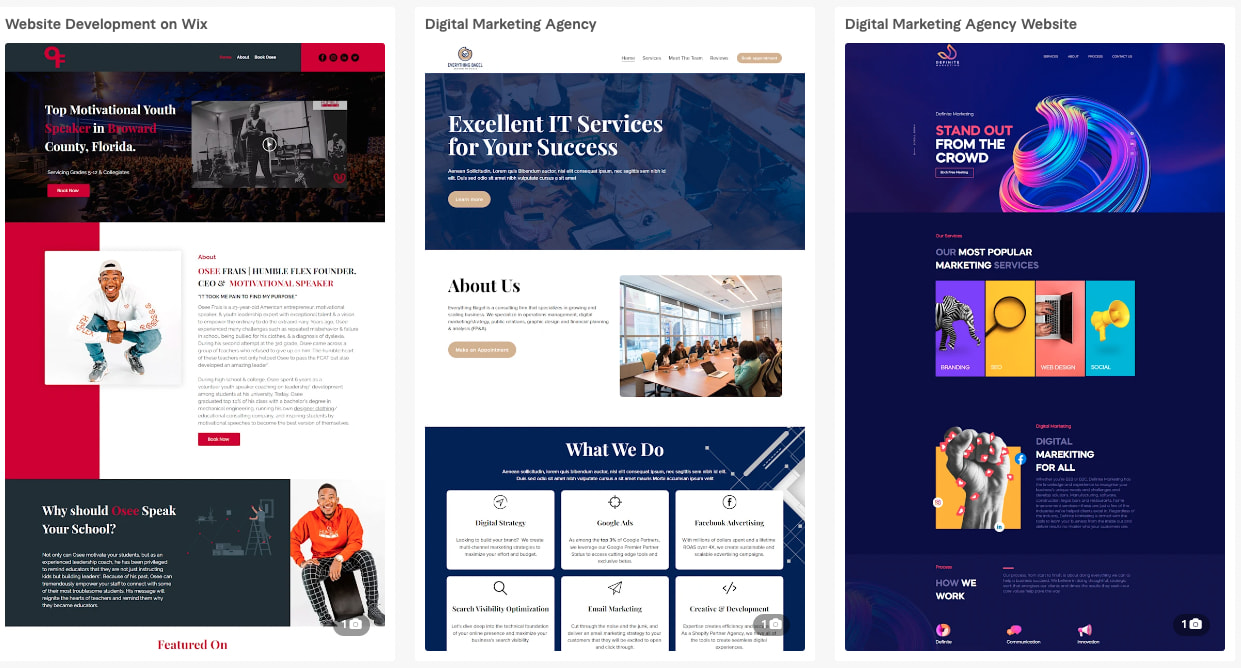
Portfolio of ambreenfalah
3. Don't just go by price
There are scores of web developers you can hire charging different project-based or hourly rates.
But don’t let price influence your hiring decision. Cheap is costlier in the long-term particularly when problems arise with your site that impact the user experience, leading to more money and time spent to fix them.
For example, buggy or slow-loading pages that cause visitors to leave (never to return again).
Talented developers don’t come cheap, but they’re always in demand because they deliver great work.
Rates also vary due to the developer’s experience, expertise, geographical location, and market conditions, which is why cost shouldn’t be the main determining factor.
4. Conduct an interview
When hiring a web developer, you need a specific list of technical interview questions to put their knowledge to the test. Depending on your circumstance, you can interview via email, a hiring platform, or via video call so you can meet the person.
Create questions that assess their soft and technical skills before engaging them on a whiteboard or coding problem.
Henry Schultz, founder of Salty Endeavors, recommends asking questions like:
Can you walk me through a recent project you worked on and your role in it?
How do you stay current with new web development technologies and industry trends?
Can you give an example of a particularly difficult problem you solved in a previous project?
How do you approach testing and debugging your code?
Can you explain how you would optimize a website for speed and scalability?
How do you handle conflicts or difficult situations with team members or clients?
Can you provide examples of your experience with responsive design and mobile optimization?
Other things you can do to know more about the candidates you select include:
Reviewing their GitHub account: Does the developer own a GitHub repository? This shows they can write code that other people can read, understand, and maintain. It also helps you verify the code’s readability, cleanliness, and structure. Check when they joined, how many followers they have, relevant language and tech keywords, public activity (commits, pull requests, issues opened), and number of repositories.
Checking their Stack Overflow activity: This helps you measure their knowledge level and involvement in the wider dev community. A high reputation rate means the dev is regularly active, asks important questions, gives helpful responses, and indicates expertise.
5. Start with a small project
Be sure to test the developer’s website building chops before hiring them. You can set up a small test project to determine their style, ability to handle different tasks, and their skills so you can gauge whether they know their stuff and can deliver.
Here are some other interviewing ideas you can try:
Ask them to walk you through their portfolio: This helps you check their coding skills and background — how they describe the context of each project, whether it was a solo project or collaboration with other devs, how they integrated with other tools or libraries, their communication skills, and their experience on unfinished projects.
Conduct live coding interviews: It’s easy to say you can code, but a live coding test is a great way for the developer to showcase their skills. That way, you can observe in real-time their logic, skills, performance, and how they explain their thought process and work. You can screen developers through coding tests to check their proficiency in programming languages and other tools.
6. Use Fiverr to find candidates
Previously, you had to put out job ads or search online job boards to find suitable candidates.
Today, freelance marketplaces like Fiverr give you unfettered access to an entire network of highly-skilled, vetted web developers from all over the world. You can connect with and build trusted, long-term working relationships and achieve more together.
Fiverr is easy to use, affordable, and helps you track your project’s progress and results through a simple dashboard. You can also pay freelancers quickly through the platform.
7. Be clear on ownership and rights
Before hiring a freelance web developer, be clear on non-disclosure agreements, contracts, and ownership rights as these could cause legal issues in the future.
“One of the biggest red flags to look for when researching developers is who owns what,” says Elizabeth Kraus, Marketing Expert & Content Producer at Fit Small Business. “Some agencies essentially lock you in forever by purchasing the domain and software needed to build and operate your site (e.g., WordPress themes and plugins).”
Kraus advises ensuring you own your domain, hosting, themes, and plugins to have full control over access and management of your website.
Key takeaways
Look for candidates who respond to your job offer within reasonable time. Most Fiverr developers respond within an hour.
Review a developer’s work samples and past clients to help you gauge their capabilities.
Don’t let price influence your hiring decision. Have a budget and find the best candidate who can meet your needs. Be flexible in case you have to pay a bit more for quality.
Start with a small test project before settling on the right developer for the job.
Use Fiverr to find the best top-rated web developers from across the world.
Establish NDAs and ownership rights to the work before starting any work.
How to use Fiverr to find web developers
Ready to find the perfect web developer for your project? You can hire one on Fiverr in a few simple steps:
1. Sign up for or sign in to your Fiverr Buyer account
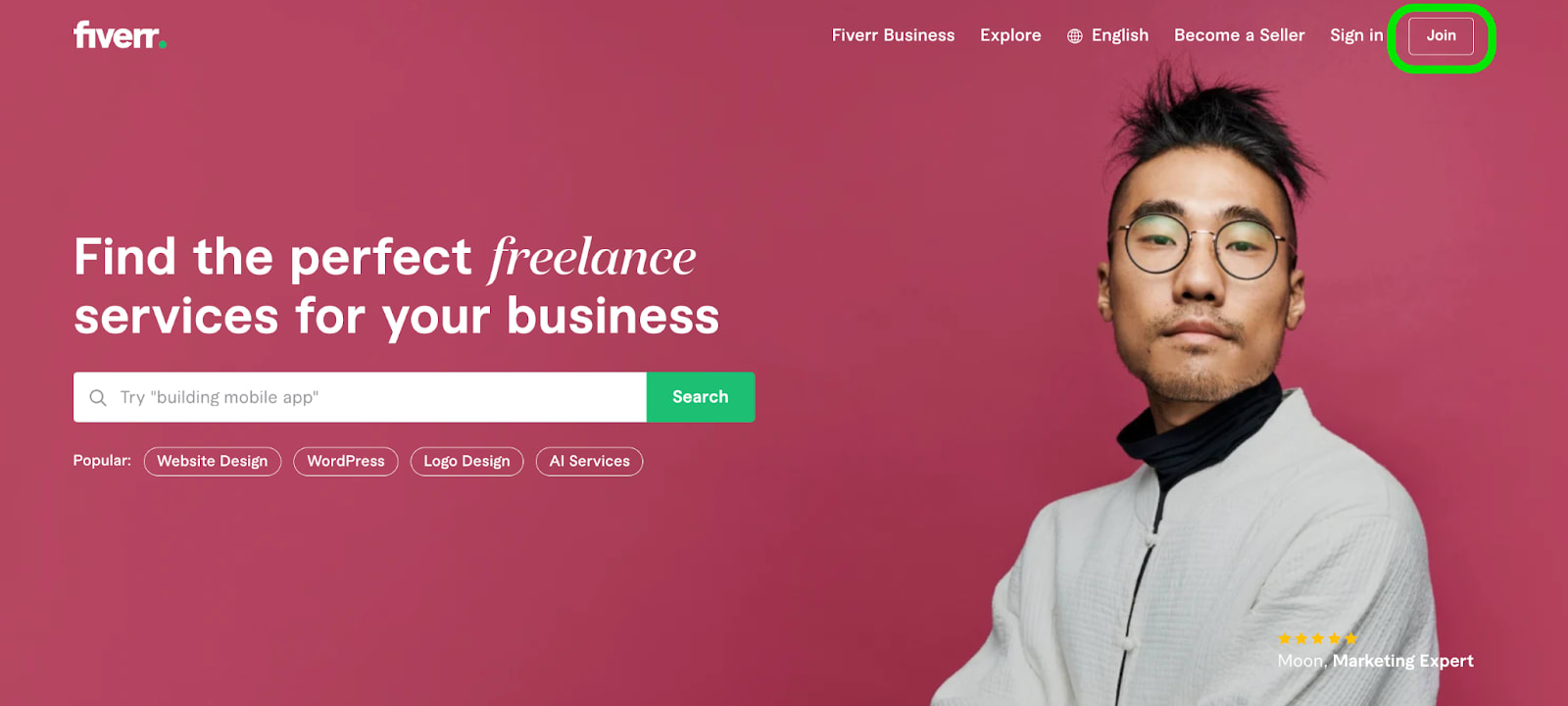
2. Hover your cursor over the Programming and Tech category, then select Website Development. Alternatively, you can enter “web developer” in the search field.
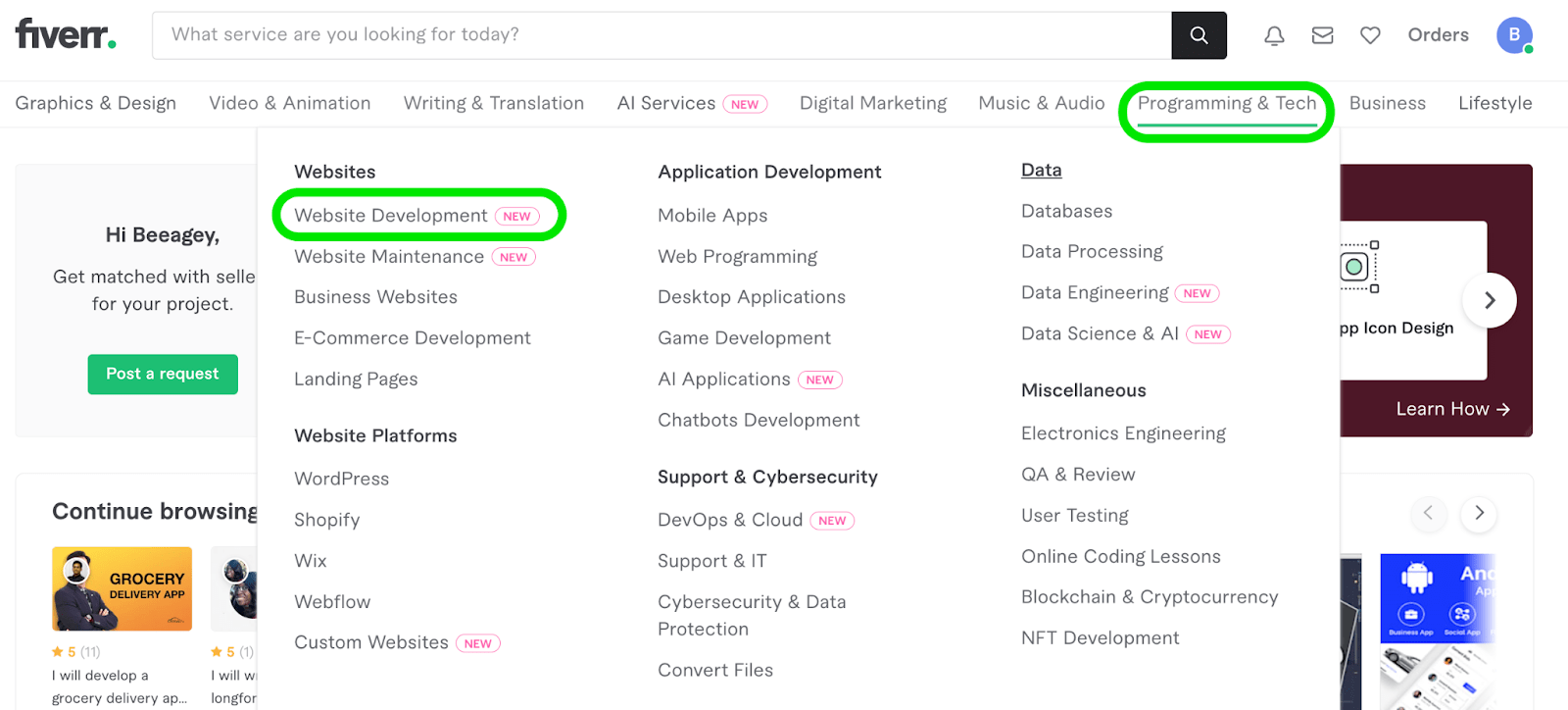
3. Fiverr will display a list of talented freelance web developers. Use the filters to refine your search and meet specific needs based on:
Service options: Website type, features, and additional services like content upload, responsive design, and speed optimization.
Seller details: Seller’s level (top-rated, new seller, level 1 or 2), language, and location.
Budget: How much you want to spend.
Delivery time: The timeframe within which you expect the developer to submit your project.
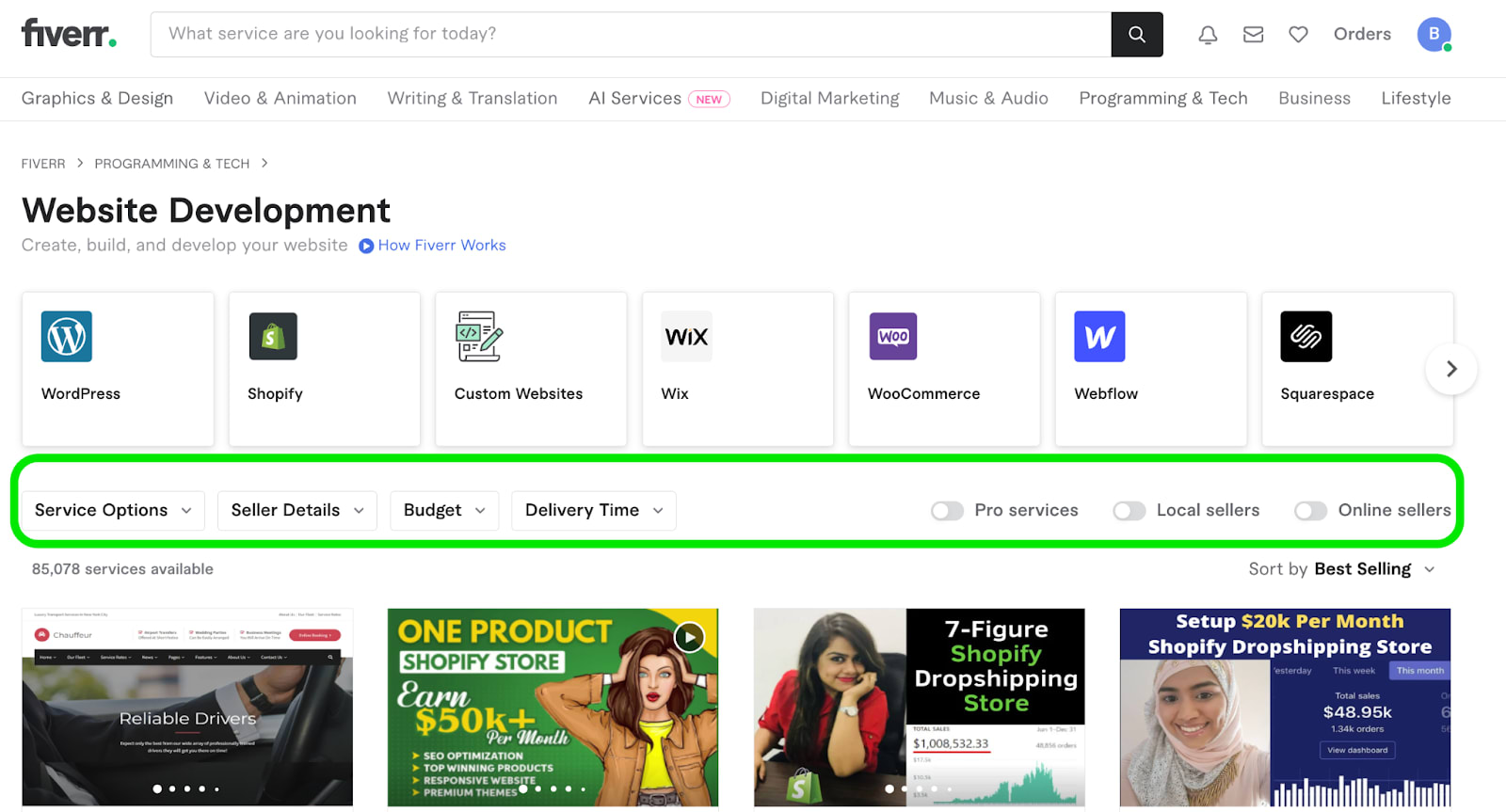
4. Select the developers you’d like to work with and review their profiles. Each thumbnail suggestion displays the freelancer’s username, rate, and services offered.

5. You can view each profile to learn more about the developer’s background, past clients, deliverables, rates, reviews, and how to contact them for further discussions.
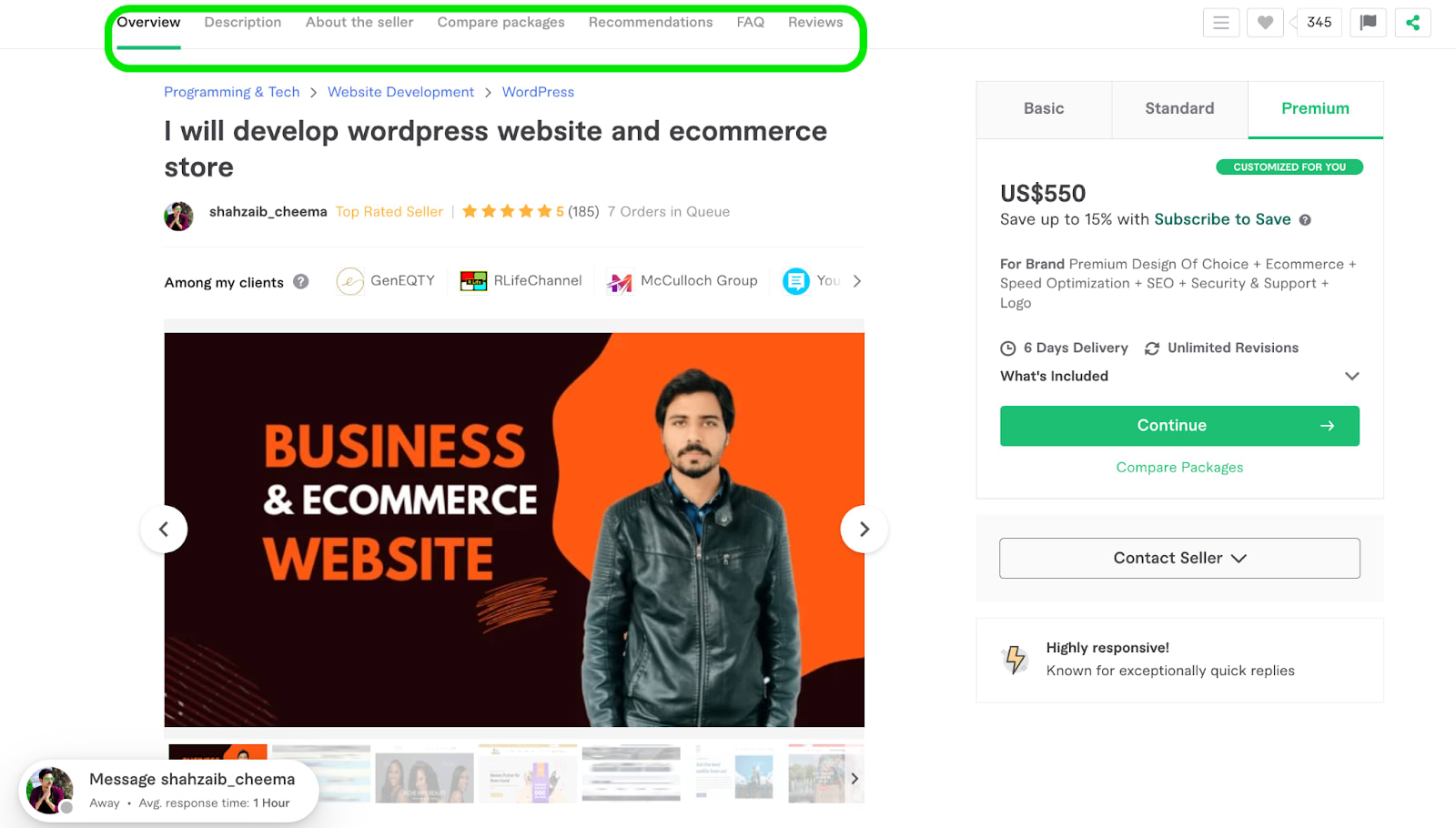
6. Once you settle on a freelancer you want to work with, place an order with them by selecting one of their packages and clicking Continue.
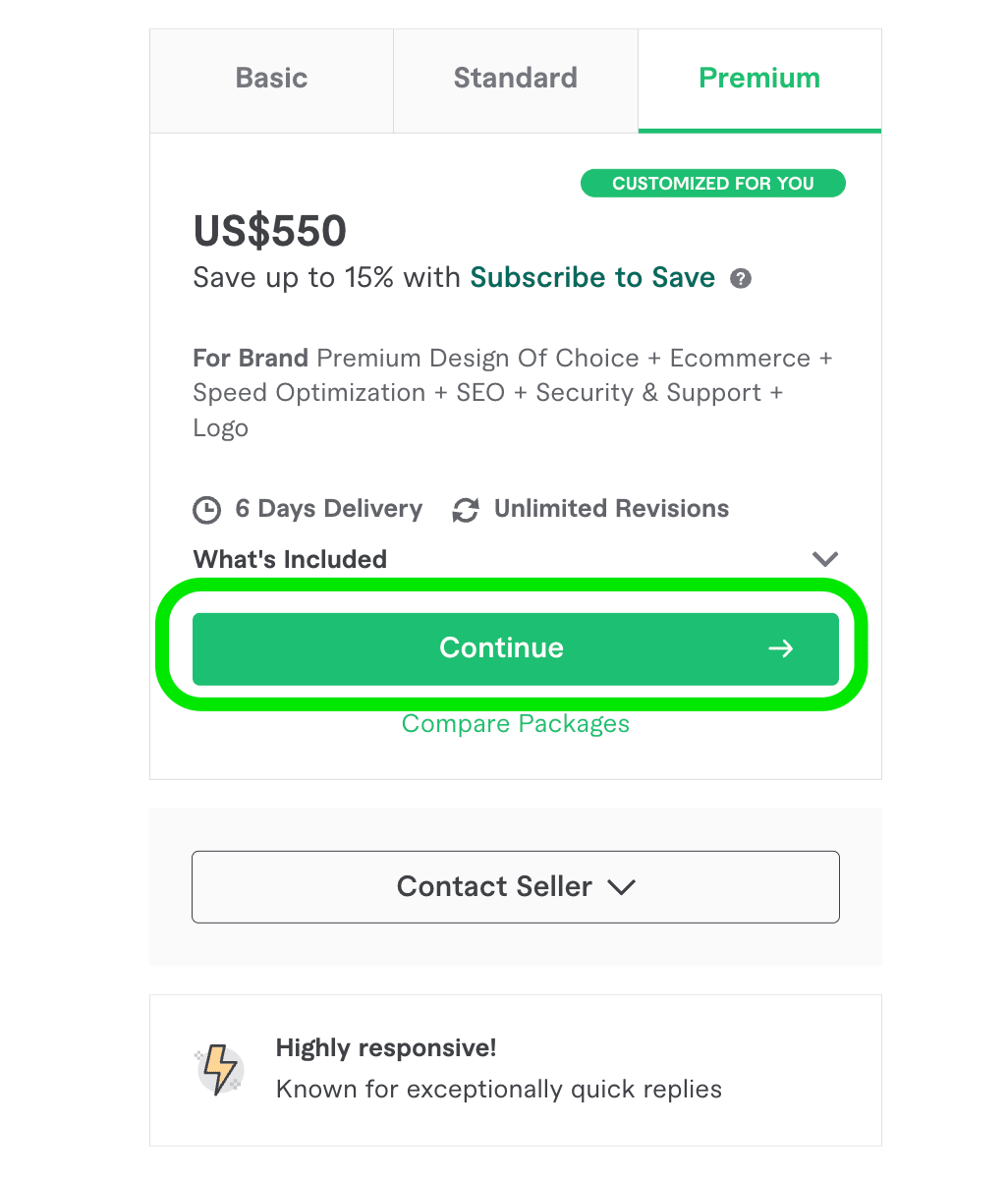
7. The freelancer will receive your order and accept it. From here on, you can track the progress with the developer through Fiverr’s messaging platform or other platforms you agree on like email or Slack.
Struggling to find freelance developers this way? Post a service request and let potential candidates contact you directly.
Do you only need one web developer?
It depends. Your business needs, budget, and the type of developer you’re looking for will determine the number to look for.
Web developers can work independently or as full-time, in-house employees. Freelance developers often collaborate directly with the client while in-house developers work on a team, with regular interactions among other team members like content writers, programmers, web designers, IT professionals, and project managers.
Your financial resources will also influence the number of developers to work with. If you’re starting out on a small project and have a limited budget, you can work with one developer — preferably a full-stack developer who can manage the frontend and backend of things.
If you run a midsize or larger company with an existing team and sizable budget, you can hire two to three or more developers depending on the project needs and complexity.
Even if you can afford to hire more than one developer, the hiring and onboarding process can be slow, tedious, and expensive, in which time you can hire a freelancer to complete a smaller project.
Vet each candidate to determine if they’re a good fit for your company’s culture and workflow.
Key takeaways
The type and size of your project will determine how many developers you need for your project.
Hiring a full-stack developer ensures you get someone to work on the frontend and backend, if you run a small business on a lean budget.
Large companies with existing teams can hire two or more developers to work alongside other team members like designers, IT professionals, and project managers.
Fiverr gives you access to all the talent you need to make your website project a success.
Why Use Fiverr to hire a freelance web developer?
Fiverr is a great place to find some of the best freelance web development talent in the world. Here’s what makes it so popular among businesses and recruiters:
Seamless communication
Fiverr makes it easy to contact potential freelance developers you want to work with. The platform’s inbox works like a chat room. You can star a conversation, and mark messages as read/unread or as spam. A seller can also initiate a Zoom call to discuss more about the project with you.
Fast and simple hiring process
It's simple and quick to hire a freelance developer on Fiverr. Use the steps we listed in above or post a service request, then track the project’s progress from your dashboard.
Easy project management tools
Fiverr offers several project management tools that allow buyers to track and manage active orders with one or more freelancers, and view completed projects. This includes:
Changing order statuses
Adding feedback or requirements to an order
Accepting sellers’ deliveries
Tipping sellers
Collaborate on files
Request revisions
There’s also a section for you to communicate with the seller if you want to chat through external tools or meet in-person.
If you have unique needs, Fiverr’s custom order feature lets you share your requirements with the Seller via Inbox and they’ll create a Custom Offer based on your needs.
Payments are easy to make via credit card or PayPal for individual milestones (as they’re completed) or a single order. Apple Pay and Google Pay are available for iOS or Android users, respectively.
And, if there are any issues, you use the Resolution Center to solve them quickly with the seller without contacting Fiverr Customer Support.
Web development experts at your fingertips
The right web developer strategically blends user experience and brand storytelling to create next-level, functional websites.
With Fiverr, sourcing web development talent has never been easier. Search for any skill set you require and browse through a list of web dev profiles with matching experiences.
Sign up to hire and commission talented web developers for your next job.



